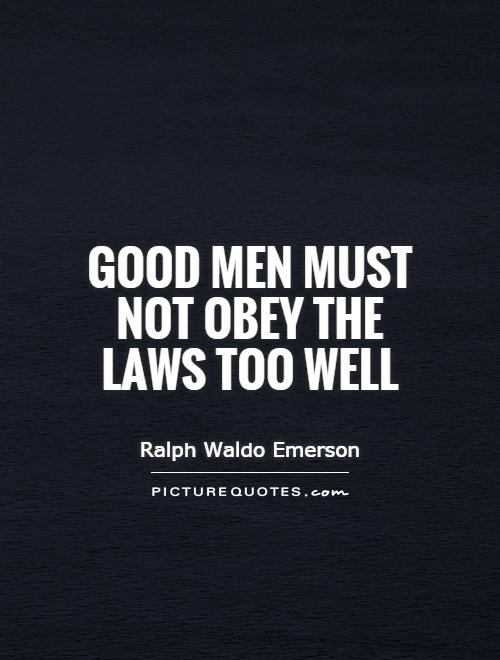Good men must not obey the laws too well

Good men must not obey the laws too well
Ralph Waldo Emerson, a prominent American essayist, lecturer, and poet, is known for his transcendentalist philosophy that emphasizes the importance of individualism, self-reliance, and nonconformity. One of his famous quotes, "Good men must not obey the laws too well," reflects his belief in the necessity of questioning authority and challenging societal norms in order to truly live a fulfilling and authentic life.Emerson believed that blindly following laws and rules without questioning their validity or morality can lead to a loss of individual freedom and autonomy. He argued that true goodness and morality come from within, from following one's own conscience and inner guidance, rather than simply obeying external laws and regulations. In his essay "Self-Reliance," Emerson encourages individuals to trust their own instincts and intuition, and to not be afraid to go against the grain and think for themselves.
Emerson's philosophy of nonconformity and individualism is closely tied to his belief in the importance of personal growth and self-discovery. He believed that by questioning authority and societal norms, individuals can uncover their true selves and live more authentic and meaningful lives. By challenging the status quo and refusing to blindly obey laws that may be unjust or oppressive, individuals can assert their own agency and make a positive impact on the world around them.
Emerson's call for good men to not obey the laws too well is a reminder that true goodness and morality come from within, from following one's own conscience and inner guidance. By questioning authority and challenging societal norms, individuals can assert their own agency and make a positive impact on the world around them. In a society that often values conformity and obedience, Emerson's words serve as a powerful reminder of the importance of individualism, self-reliance, and nonconformity.












 Friendship Quotes
Friendship Quotes Love Quotes
Love Quotes Life Quotes
Life Quotes Funny Quotes
Funny Quotes Motivational Quotes
Motivational Quotes Inspirational Quotes
Inspirational Quotes